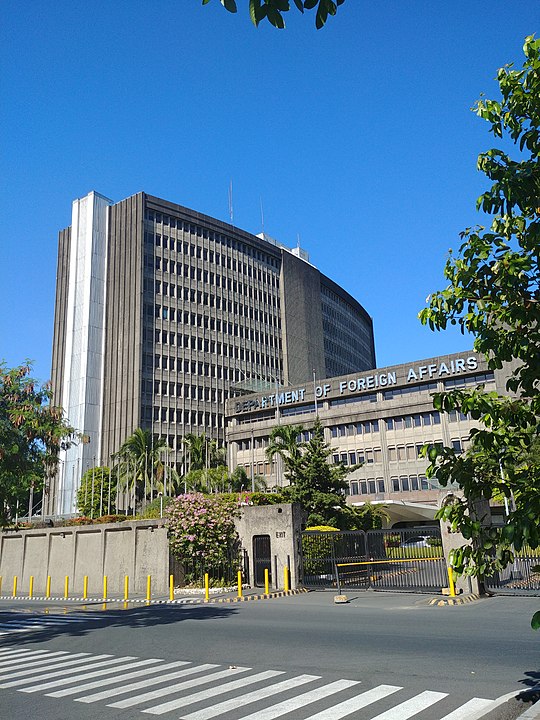News
Get your facts straight, DFA tells European Parliament

MANILA – The European Parliament should listen to more respectable sources instead of obtaining information from militant front organizations masquerading as legitimate civil society organizations and disgruntled members of the political opposition who do not represent the majority of the Philippine electorate.
In a strongly-worded statement on Sunday, the Department of Foreign Affairs (DFA) condemned what it called the misguided attempt of the European Parliament to interfere in the electoral process through a recent resolution that raised anew allegations of human rights violations and warned of possible trade sanctions.
The DFA called the resolution “unfair, largely baseless, and presumptuous”, prompted by European supporters of libelous journalists and bitter critics of the Duterte administration “because they miserably lost the previous election”.
“Far from what is presented in the resolution, the Philippines is a vibrant democracy that respects and protects the freedoms of every citizen; and upholds all their rights, preeminently the rights to life, liberty, and, above all, safety and protection from the lawless and violent,” the statement read.
The DFA said the allegations are being addressed by the landmark United Nations Joint Programme (UNJP) for Human Rights, framed precisely to address the issues but still respectful of the legal and accountable mechanisms that are already set in place in the country.
“Substantive, credible and forward-looking, the UNJP seeks to strengthen the Philippines’ compliance with international human rights obligations, fortify the human rights dimension in law enforcement and investigative work, and enhance the capacity of national institutions and actors to promote and protect human rights while keeping the public safe: the paramount obligation of a state and the justification for the expense of maintaining one,” the statement read.
Following an inclusive and transparent process of consultations, the UNJP was launched in July 2021 in the presence of among others, Chargé d’Affaires Rafael de Bustamante Tello of the Delegation of the European Union to the Philippines.
The Department of Justice likewise has the Administrative Order 35 Task Force, the government’s inter-agency committee which investigates violation of human rights and humanitarian law and holds accountable humanitarian law violations by terror groups long known to recruit minors and use prohibited weapons, such as anti-personnel mines.
“We therefore strongly advise EU Parliament vice president, Heidi Hautala, to prove her information, specifically with the EU Delegation to the Philippines, before she demands anything from the Philippines. Her disrespectful language disregards these ongoing efforts of the Philippines and the United Nations, and the mechanisms and processes that inform their joint efforts to advance human rights,” the DFA stated.
The resolution adopted Thursday called for the abolition of the National Task Force to End Local Communist Armed Conflict and amendments to the Anti-Terrorism Act (ATA) and its implementing rules and regulations.
The ATA has been declared constitutional by the Supreme Court, except for a few provisions.
The Philippines was also warned it will lose perks and market access under the Generalized Scheme of Preferences Plus (GSP+), which gives developing countries a special incentive but must implement 27 international conventions on human rights, labor rights, environment, and good governance. In return, the European Union (EU) will cut its import duties to zero on more than two thirds of the tariff lines of their exports.
Aside from the Philippines, the other GSP+ beneficiary countries are Bolivia, Cape Verde, Kyrgyzstan, Mongolia, Pakistan, and Sri Lanka.
The DFA acknowledged though that the views of the European Parliament do not reflect those of the EU as a whole or of its individual member states.
“Our engagement with the European Commission on the GSP+ process is a more accurate indication of the actual situation involving good governance, rule of law, and human rights in the Philippines. We look forward to welcoming the next EU GSP+ monitoring mission on February 28 to March 4, 2022,” the DFA said.
The DFA said European Parliamentarians must realize that in once again calling on the Philippines to adhere to democratic principles that Filipinos have widely practiced, they themselves have violated these principles and intruded in the internal affairs of a country that only seeks to maintain harmonious relations with the EU and all its member states.
The European Parliament issued similar resoltuions in 2016, 2017, 2018, and 2020.
“Not least when they refuse to pay heed to the democratic will of the vast majority of the Filipino people who clearly support the present duly-elected government and its policies. For the Parliament to pass a resolution of this manner is a clear attempt to influence the outcome of our coming elections in May instead of accepting the sovereign will of the Filipino people as manifested in the previous elections,” the DFA said.





















